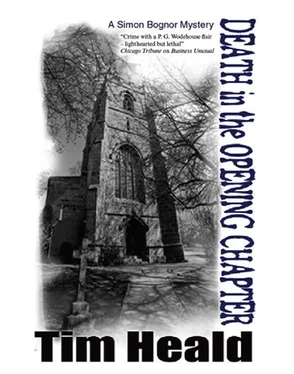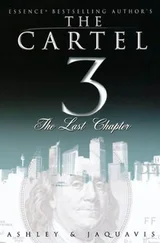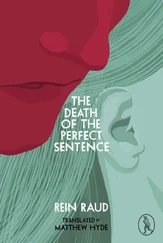Tim Heald - Death in the opening chapter
Здесь есть возможность читать онлайн «Tim Heald - Death in the opening chapter» весь текст электронной книги совершенно бесплатно (целиком полную версию без сокращений). В некоторых случаях можно слушать аудио, скачать через торрент в формате fb2 и присутствует краткое содержание. Жанр: Криминальный детектив, на английском языке. Описание произведения, (предисловие) а так же отзывы посетителей доступны на портале библиотеки ЛибКат.
- Название:Death in the opening chapter
- Автор:
- Жанр:
- Год:неизвестен
- ISBN:нет данных
- Рейтинг книги:5 / 5. Голосов: 1
-
Избранное:Добавить в избранное
- Отзывы:
-
Ваша оценка:
- 100
- 1
- 2
- 3
- 4
- 5
Death in the opening chapter: краткое содержание, описание и аннотация
Предлагаем к чтению аннотацию, описание, краткое содержание или предисловие (зависит от того, что написал сам автор книги «Death in the opening chapter»). Если вы не нашли необходимую информацию о книге — напишите в комментариях, мы постараемся отыскать её.
Death in the opening chapter — читать онлайн бесплатно полную книгу (весь текст) целиком
Ниже представлен текст книги, разбитый по страницам. Система сохранения места последней прочитанной страницы, позволяет с удобством читать онлайн бесплатно книгу «Death in the opening chapter», без необходимости каждый раз заново искать на чём Вы остановились. Поставьте закладку, и сможете в любой момент перейти на страницу, на которой закончили чтение.
Интервал:
Закладка:
‘I feel it in my gut. More prosecco?’
The Bognors accepted and drank. In the old days, they would just have drunk with no questions asked. Nowadays, they had a problem. In today’s world, everyone preferred it if one didn’t drink alcohol at all. In any event, one was not allowed very much. The Bognors, however, belonged to a world and a generation which enjoyed a drink and did not regard this as a problem. Change of life. Bit like gaiety. What had once been a guilty secret was now an open affirmation.
‘Anyway,’ said Gunther, ‘I didn’t kill him. I don’t know who did. I have a watertight alibi and no motive. May I go now and make porridge?’
Bognor glanced at his wife. She agreed, but no third party would have known. They took their glasses into what was, in former days, the snug, and was now all beige furniture and black and white photographs.
‘There was a time,’ said Bognor, ‘when cooks were just cooks, and chefs worked at a handful of great hotels.’
‘Or were French.’
‘Quite.’ Bognor watched the bead in his glass, saw the bubbles ascend and vanish as they broke the surface.
‘Don’t like him,’ said Bognor.
‘Doesn’t make him a murderer.’
‘Don’t like his food either.’
‘Nor does that.’
‘I suppose not.’
They stared morosely at the dead flat-screen.
‘So, you eliminate him from your enquiries?’
‘I’ll talk to a sous-chef or two just to firm up his alibi, but basically he’s eliminated, yes. Strange interviewing him. I felt like that greengrocer on Celebrity Masterchef. Nothing but meaningless superlatives and droolings about how he’s getting a sense of well-rounded peach fragrance. I’ve never had snail porridge, but I’m more interested in discussing that, than I am in establishing his alibi. If you know what I mean.’
‘Up to a point,’ agreed Monica, ‘though if he didn’t have an alibi and was a murderer, that would make him interesting, wouldn’t you say?’
Bognor considered this.
‘You mean,’ he said, ‘that haute cuisine is more interesting than murder.’
‘The other way round, actually. But the one against the other.’
‘Hmm,’ said Bognor, ‘we live in a world which rates them both pretty high. After all, cooks and murderers make flawless celebrities, along with models and failed spin bowlers.’
‘Especially if they can dance.’
They both laughed. Their world seemed real enough to them and yet, to dancing cooks and models, it would have carried just the whiff of make-believe that they ascribed to television, soundbites and the meretricious in general. You paid your money and you took your choice, and the future would deliver a verdict which would change according to the times, and whether or not the world survived. In the meantime, Bognor reckoned that all you could do was the best possible according to one’s own lights, and not to be seduced by bright lights, instant success and a certain sort of suit.
Talking of which, he supposed that he really ought to interview Sir Branwell and Lady Fludd. In the event of things going wrong and of publicity ensuing, a failure to interview the Fludds would be held against him. Apocrypha College would be called in evidence to prove some sort of old school tie, and the fact that he and Monica were staying as guests up at the Manor would not look good. The headlines would scream, pseudo-egalitarians would snigger, and there would be a general consensus that it served him right, that he had fallen down on the job, and what could one expect from old-fashioned, fuddy-duddy, grumpy, long-lunching plutocrats anyway.
Bognor felt none of these things, and regarded himself as being, in practically every important aspect, at the well-honed cutting edge of life in general. Even so, he had seen enough of real life to know that he should appear to play by the book, if only to avoid having it thrown at him if things went wrong.
Which meant interviewing Branwell and Camilla, if only for form’s sake.
It would yield nothing, but it would look good on paper and better still in the paper, if it ever got that far. The Fludds would dislike the interview, but the possible alternative was almost too dire to contemplate.
ELEVEN
Sir Branwell had never, well hardly ever, heard of anything so ludicrous in his life. It took the absolute chocolate digestive. It was the Bath Oliver to end all Bath Olivers. A real Huntley and Palmer. I mean he had never been so… well if the suggestion had come from anyone but Simon he would… on the other hand… was he absolutely certain… even in this day and age… I mean really.
And so on.
Bognor explained that the conversation was an essential formality. A formality, but essential nonetheless. It was simply a matter of insuring against criticism, of demonstrating efficiency, even-handedness and, above all, justifying the apparently high-handed decision to bypass the usual channels and allow Bognor to conduct the investigation instead of the local police force.
Simon began, naturally, by asking the same question with which he had opened his interview with the cook. Where had the Fludds been between roughly five and seven the previous day, that being the time, as near as could be ascertained, at which the Reverend Sebastian had passed by on to the other side?
‘Oh for God’s sake, you know perfectly well where we both were,’ exploded Sir Branwell. ‘We were here, with you. All the time, until Dorcas came in and told us that she had found her husband dead in church. You know that perfectly well.’
‘That’s not the point,’ explained his interlocutor patiently. ‘I know perfectly well, but the coroner won’t, the court won’t, the press won’t. I need to have your alibi on the record so everyone can see it.’
‘Bugger the record,’ said the baronet. ‘I have absolutely not the slightest interest in everyone, as you put it, seeing the record. I am entirely free to come and go as I please, without the world and his wife having to be told. It’s completely outrageous. Where Camilla and I are, at any time of the day or night, is nobody’s business but our own.’
‘A man is dead,’ said Bognor. ‘Put yourself in everyone else’s position.’
‘On a point of fact,’ Sir Branwell was being dangerously cool, ‘a man is not dead. The Reverend Sebastian Fludd is dead. He was not a man in the accepted sense. He was the vicar of St Teath’s and my cousin. I will not have his memory blasphemed in this fashion. “A man”, indeed. That gives entirely the wrong impression. And I see absolutely no reason at all why I should put myself in everyone else’s position. That is not where I want to be, and it is, to use your own word, completely “inappropriate”. My position is my position, and I have no desire to be anywhere else. Nor is any useful purpose being served by pretending otherwise.’
‘For my sake,’ pleaded Monica. ‘It’ll make life easier for all of us. Help to beat off jawnalists. Allay criticism. Please.’
‘I don’t see it, Monica,’ said Camilla, ‘I really don’t. We know where we were. You know where we were. Why should anyone else know?’
‘That’s the way it is,’ said Bognor.
‘Well, it shouldn’t be,’ said Sir Branwell snippily. ‘Just because you say that’s the way it is, doesn’t mean that it’s right and, or, proper. If people such as us don’t stand up and allow ourselves to be counted, then what the hell’s the point.’
‘That’s exactly what I’m asking,’ said Bognor, trying to keep the triumph out of his voice. ‘I just want you to stand up and be counted.’
‘Don’t be so childish,’ said Sir Branwell, sounding childish. ‘I decide whether or not we’re going to stand up and be counted. Not any old Tom, Dick or Harry.’
Читать дальшеИнтервал:
Закладка:
Похожие книги на «Death in the opening chapter»
Представляем Вашему вниманию похожие книги на «Death in the opening chapter» списком для выбора. Мы отобрали схожую по названию и смыслу литературу в надежде предоставить читателям больше вариантов отыскать новые, интересные, ещё непрочитанные произведения.
Обсуждение, отзывы о книге «Death in the opening chapter» и просто собственные мнения читателей. Оставьте ваши комментарии, напишите, что Вы думаете о произведении, его смысле или главных героях. Укажите что конкретно понравилось, а что нет, и почему Вы так считаете.












